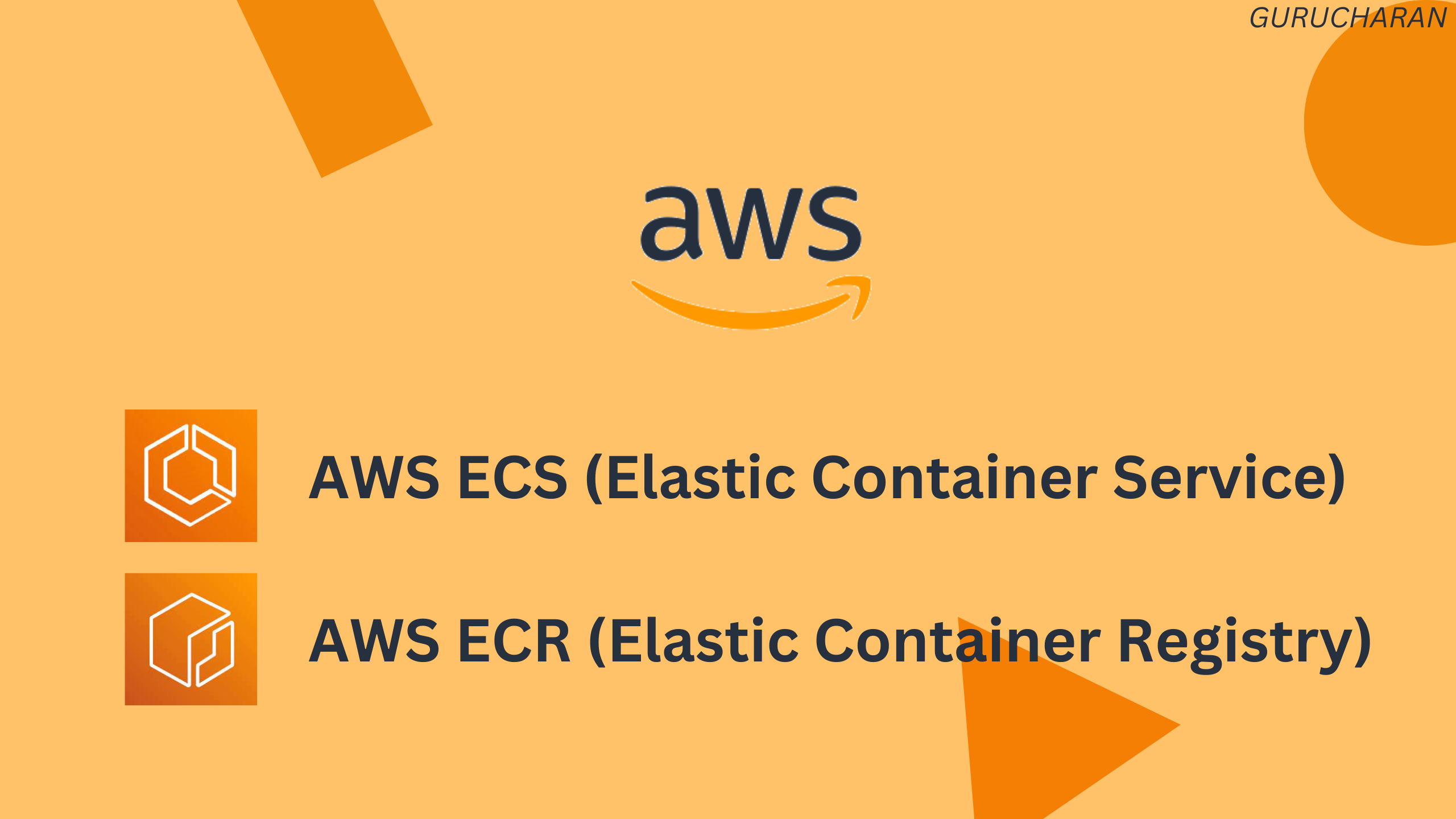AWS ECS and AWS ECR.
 Gurucharan
Gurucharan
AWS ECS (Elastic Container Service) and AWS ECR (Elastic Container Registry) are two related AWS services that are designed to work together to provide a complete container management solution. In this blog post, we will cover what each service does, how they work together, and the benefits of using them.
AWS ECS
AWS ECS is a fully managed container orchestration service that allows you to easily run, scale, and manage Docker containers in the cloud. With ECS, you can launch and manage Docker containers across a fleet of EC2 instances or using AWS Fargate, which is a serverless compute engine for containers.
ECS provides a range of features that make it easy to run containers in production, including:
Task Definitions
A task definition is a blueprint that defines how a container should be run. It specifies the Docker image to use, the amount of CPU and memory to allocate, and other container settings.
Services
A service is a set of tasks that run in a cluster. ECS ensures that the desired number of tasks are running at all times, and will automatically scale the service up or down based on demand.
Load Balancing
ECS integrates with AWS Application Load Balancers or Network Load Balancers to automatically distribute traffic to containers running in a service.
Auto Scaling
ECS can automatically scale a service based on a number of metrics, including CPU and memory usage, network traffic, and custom CloudWatch metrics.
Integration with Other AWS Services
ECS integrates with other AWS services such as Amazon S3, Amazon CloudWatch, and AWS IAM to provide a complete container management solution.
AWS ECR
AWS ECR is a fully managed Docker container registry that makes it easy to store, manage, and deploy Docker images. ECR is integrated with ECS, making it easy to deploy images to containers running in a service.
ECR provides a range of features that make it easy to manage Docker images, including:
Private Docker Registries
ECR provides private Docker registries that are accessible only to users and services within your AWS account.
Secure Access Control
ECR integrates with AWS Identity and Access Management (IAM) to provide secure access control for Docker images.
Lifecycle Policies
ECR provides lifecycle policies that can automatically clean up unused images, keeping your registry clean and efficient.
High Availability and Durability
ECR is designed for high availability and durability, with automatic replication across multiple Availability Zones.
How ECS and ECR Work Together
ECS and ECR are designed to work together to provide a complete container management solution. Here's how they work together:
First, you create a Docker image and push it to ECR.
Then, you create a task definition in ECS that specifies the Docker image to use and other container settings.
Next, you create a service in ECS that uses the task definition. ECS will automatically launch and manage the required number of tasks.
Finally, you can configure an AWS load balancer to distribute traffic to containers running in the service.
Benefits of Using ECS and ECR
Using ECS and ECR together provides a number of benefits, including:
Simplified Container Management
ECS and ECR provide a fully managed container management solution that makes it easy to run, scale, and manage Docker containers in the cloud.
High Availability and Durability
ECS and ECR are designed for high availability and durability, with automatic replication across multiple Availability Zones.
Integrated Security
ECS and ECR integrate with AWS IAM to provide secure access control for Docker images and containers.
Scalability and Performance
ECS and ECR provide auto scaling, load balancing, and other features that make it easy to scale containers to meet demand and ensure high performance.
Integration with Other AWS Services
ECS and ECR integrate with a wide range of other AWS services, making it easy to build and deploy containerized applications using a complete AWS stack.
Cost Savings
Using ECS and ECR can help you save costs compared to running containers on your own infrastructure. ECS and ECR offer a pay-as-you-go pricing model that only charges you for the resources you use.
Conclusion
AWS ECS and AWS ECR are two powerful services that provide a complete container management solution. ECS makes it easy to run, scale, and manage Docker containers in the cloud, while ECR provides a fully managed Docker container registry that makes it easy to store, manage, and deploy Docker images. Together, they provide a powerful platform for building and deploying containerized applications on AWS.
Thank you for reading this blog and if any queries or if any corrections to be done in this blog please let me know.
contact us in Linkedin ,Twitter or email-id gurucharanu716@gmail.com
Subscribe to my newsletter
Read articles from Gurucharan directly inside your inbox. Subscribe to the newsletter, and don't miss out.
Written by

Gurucharan
Gurucharan
Gurucharan DevOps Engineer | Continuous Integration/Continuous Deployment | Automation Enthusiast Welcome to my LinkedIn profile! I'm an aspiring DevOps engineer with a strong background in software development and system administration. My goal is to bridge the gap between development and operations, delivering efficient and reliable software solutions through seamless collaboration. With experience in continuous integration/continuous deployment (CI/CD) pipelines, I specialize in automating software delivery processes to enhance development efficiency and quality. I excel in fast-paced, dynamic environments, leveraging infrastructure as code (IaC) tools like Terraform and cloud platforms such as AWS, Azure, and GCP to create scalable and resilient architectures. My technical skill set includes proficiency in scripting languages (Python, Bash), containerization technologies (Docker, Kubernetes), and configuration management tools (Ansible, Chef). I possess a deep understanding of networking protocols and security principles, ensuring robust and secure environments. Beyond technical experience, I believe in collaboration, cross-functional teams, and continuous learning. I thrive on solving complex challenges and seek opportunities for growth and innovation. If you're looking for a passionate DevOps engineer to streamline software delivery, enhance system reliability, and drive organizational success, let's connect! I'm open to exciting opportunities and collaborations. Feel free to reach out via LinkedIn or email. Let's build the bridge between development and operations, enabling continuous improvement and innovation!